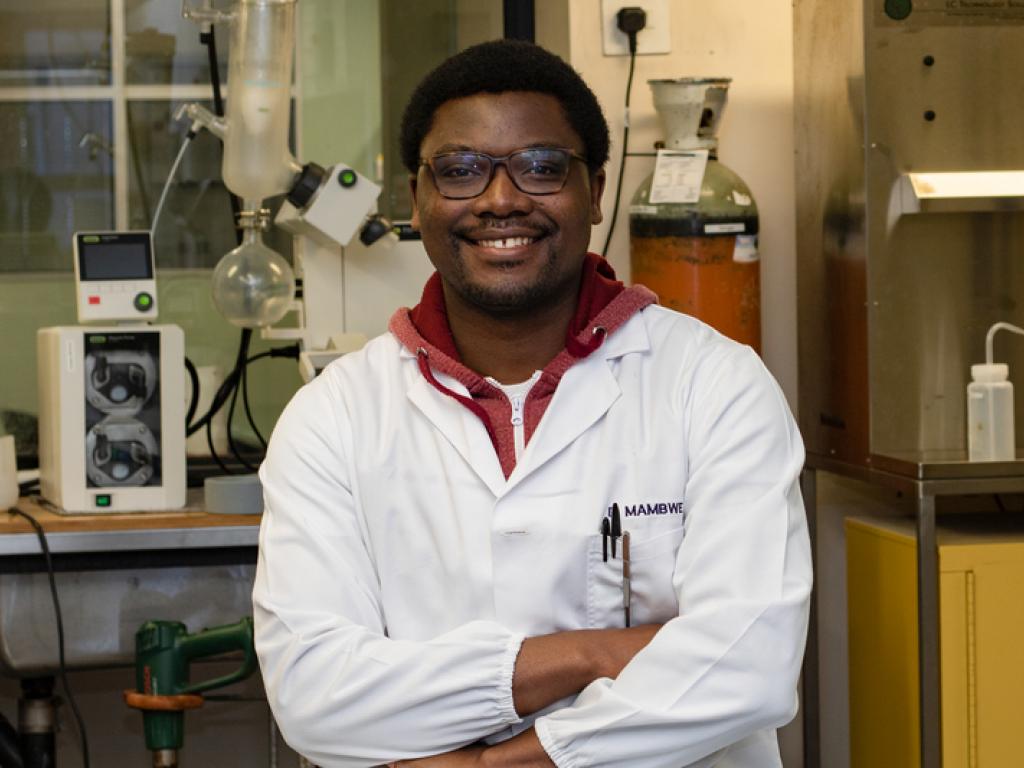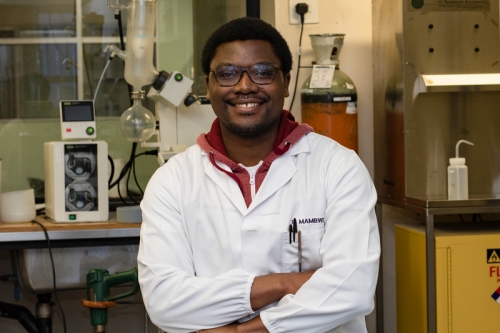Young UCT scientist selected for international leadership initiative


After contracting malaria himself as a child, Dickson Mambwe is determined to make an impact in the fight against the disease.
“Who knew a boy from rural Mansa, Zambia could come this far, stand a chance and become successful at opportunities like this?” These are the words of Dickson Mambwe, a University of Cape Town (UCT) PhD student working in the field of drug discovery, after recently being selected for the 2019 CAS Future Leaders Program.
An initiative of the American Chemical Society (ACS), it’s one of the most prestigious and fiercely contested leadership programmes in the world. Mambwe is one of only thirty early-career scientists selected from across the globe to participate this year. Since its inception 10 years ago, there have only been two other participants selected from the African continent (both also from UCT).
Each successful applicant receives a paid trip to the CAS (Chemical Abstract Services) headquarters in Columbus, Ohio as well as the ACS Fall National Meeting & Exposition in San Diego, California. These two events will be taking place over a period of two weeks in August this year. Participants are also awarded a three-year prepaid ACS membership, a certificate of distinction and USD$ 1 000.
“I feel proud and immensely humbled by the achievement and look forward to representing UCT,” says Mambwe.
Offering young scientists an opportunity to tap into the global research pipeline and gain exposure to global perspectives, it is an excellent opportunity to expand networks and even connect with potential research partners.
“I look forward to sharing ideas and creating networks for fruitful future collaborations,” says Mambwe. “I believe this is what science should be about if we are to make a meaningful and significant impact.”
"I hope to, one day, make a meaningful contribution to society and the best way to do that is to connect with other scientists from across the world."
Apart from this, the programme will also offer Mambwe the opportunity to gain a deeper understanding of the corporate machinery and research tools provided by CAS, which he will then be able to apply to his own research back at UCT.
Fighting malaria through drug discovery
After completing his undergraduate degree in chemistry at the University of Zambia and working in industry for a number of years, Mambwe’s dream to continue his academic studies was fulfilled in 2017 when he was accepted for a master's degree at UCT and joined Professor Kelly Chibale’s research group.
Within a year, he upgraded to a PhD. Working closely with Chibale, Mambwe is conducting a project to reposition a known antihistamine drug for malaria.
“[The drug] was withdrawn from the market by the FDA (US Food and Drug Administration), because it was found to be cardiotoxic with high risks of fatality,” he explains.
Sometime later, the drug was part of a high throughput screen for inhibitors of the human malaria parasite and discovered to possess antimalarial properties.
“So, this is where my project comes in – to try and see if we can rescue this drug by chemical modification to remove its current risk factors, and hopefully use it for the treatment of malaria.”
Personal significance
Adding significance to Mambwe’s drug discovery work, is the fact that he sees it more as a calling than a mere career path.
“Even though I didn’t know it at a very young age, I’m quite certain that drug discovery is where I need to be,” he muses and then goes on to explain how, as a child, malaria almost claimed his life.
After contracting the disease at about three years old, he developed a condition called Hyperreactive Malarial Splenomegaly where the infected red blood cells clog up the spleen, causing it to enlarge.
“At the time, the diagnostic tools were not yet highly developed where I grew up in Zambia, so it took weeks to identify the problem,” he explains.
Not being able to alleviate her little son’s suffering, Mambwe’s mother eventually took a bus to the city where physicians at the Arthur Davidson Children’s Hospital made the diagnosis. Dickson spent the next three months on anti-malarial drug Chloroquine.
With such a strong ‘why’ underpinning his research, it’s hardly surprising that Mambwe has established himself as a promising leader among young scientists around the globe.
“Because of this – for my family and especially my mother – doing drug discovery research today is the best career course I could have taken,” he says. “So, it’s not only about my love of science, but also has a very personal story attached.”
Being selected for the CAS Leadership Program comes hot on the heels of his participation in the Next Generation Scientist Program by Novartis and University of Basel in Switzerland last year. With such a strong ‘why’ underpinning his research, however, it’s hardly surprising that Mambwe has established himself as a promising leader among young scientists around the globe.
He hopes that being selected to participate in opportunities like these may serve as proof of just how far hard work, commitment and consistency can take you.
“I count my blessings as they come, big or small,” Mambwe says. “I’ve always aspired not only to making a difference, but to be a source of inspiration to others as well, because, truly, one is never defined by one's circumstances.”
Story: Nadia Krige
